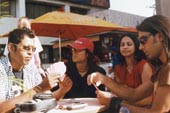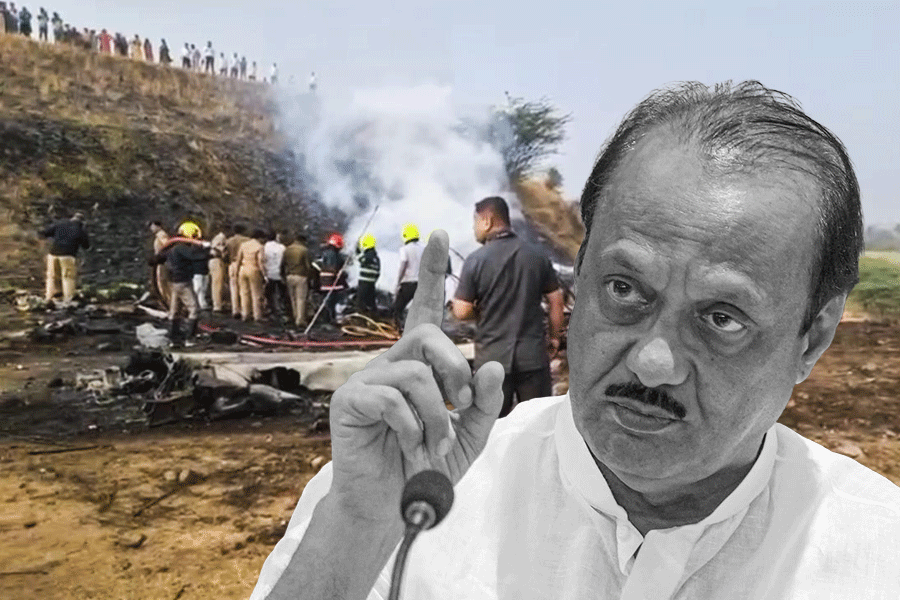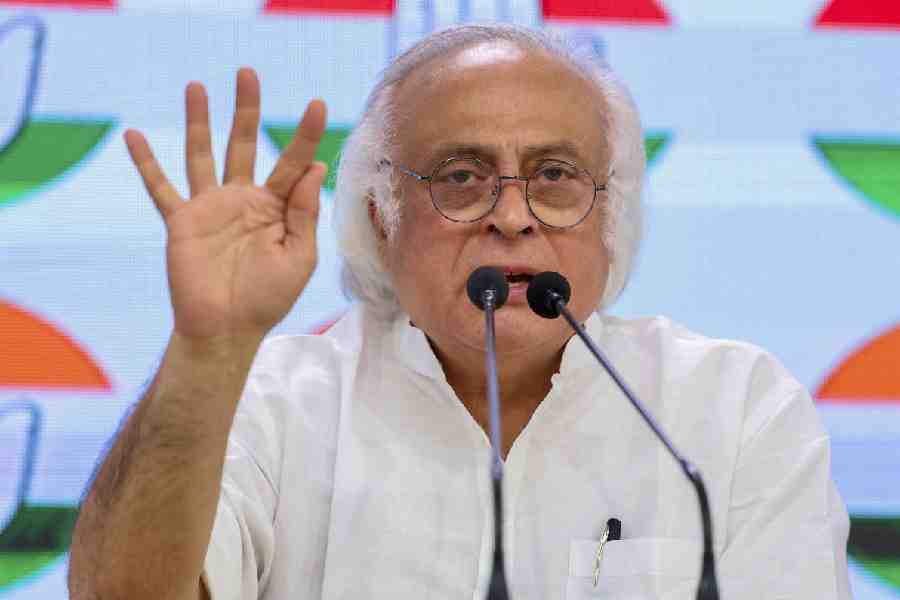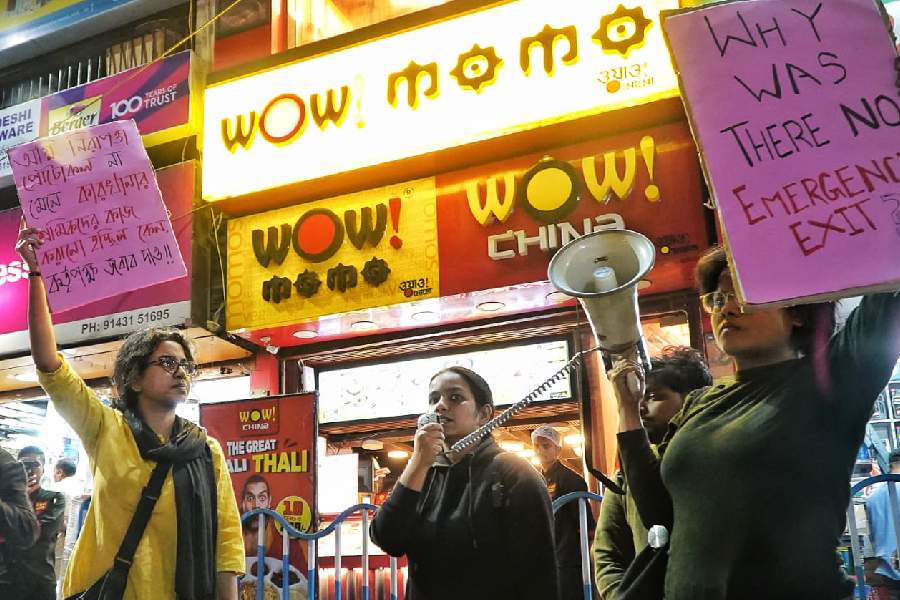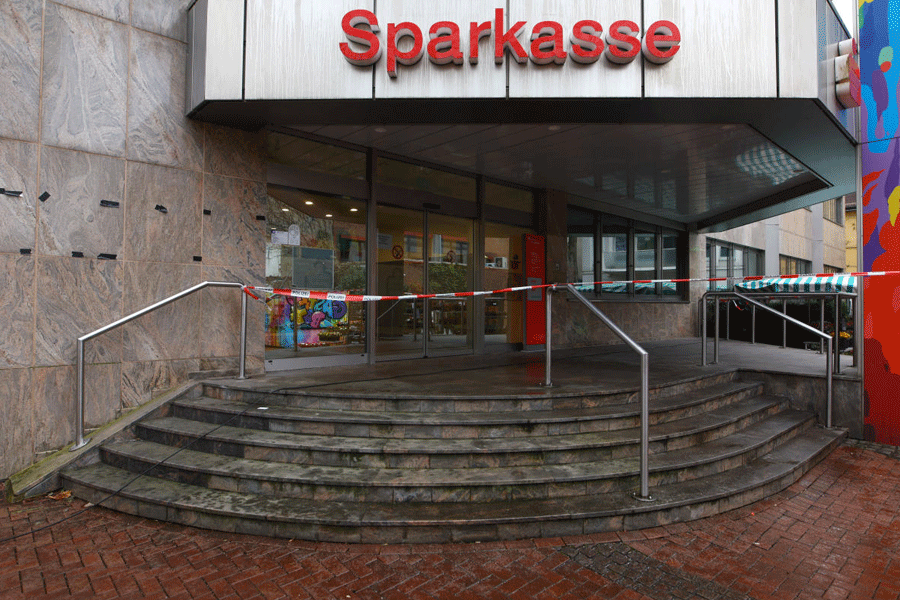 |
| CHANGE ON THE CARDS: Youths hang out at a coffee shop in Bangalore. Photo: Hellmuth Conz |
Ramesh Ramanathan, head of a Bangalore-based NGO, had assumed his ?khichdi Kannada? was enough knowledge of the language to get him by in the city. He had to do a rethink last month. Ramanathan was addressing a public meeting when someone from the crowd suddenly asked him to speak in Kannada.
Ramanathan was taken aback. ?A young man stood up to say that when in Karnataka, I should speak in Kannada. A few people clapped in agreement,? he recalls.
Ramanathan always thought language was not an issue in Bangalore. Unlike Chennai, this was ? he believed ? a city where one could feel at home without knowing the local language.
But Bangalore is now talking in different tongues. A ?Karnataka for Kannadigas? movement is brewing in the city. A section of Bangaloreans is up in arms against the city?s outsider-friendly, open-house image, and is demanding a change. ?Bangalore hardly looks like a Kannada city. We want our city back,? says Agni Shridhar, founder-member of the Karunada Sene, a just-launched pro-Kannada activist group.
Local discontent is finding different forms. When the Bangalore Habba, the city?s hugely popular annual cultural festival, opened last week, some called it an ?MNC conspiracy?. Dharnas were held, and protesters waylaid the chief minister?s cavalcade when he was on his way to flag off the festival ? sponsored by the state government and MNCs, with Ogilvy & Mather doing the advertisements. The Habba lost its zing at word go. ?Multinationals sponsored the Habba only to build their brands. Imperialist forces are attacking us through cultural events,? says Shridhar.
 |
| LIGHTS OFF: A ‘No Show’ board put up outside the Rex Theatre in Bangalore. (AFP) |
Signs of the Kannada movement ?where an anti-MNC drive has merged with a regional campaign ? are there for all to see. A local resident recalls how she suddenly found one morning that all hoardings of a cellular company had been blackened out.
The policeman on duty outside Rex Theatre on Bangalore?s Brigade Road ?where Veer Zaara is playing ? is a reminder of the ongoing turf war in the film industry. The Kannada film industry has been demanding a three-week moratorium on films produced outside the state, but Yash Chopra obtained a Supreme Court order seeking protection for theatres screening Veer Zaara.
Violence broke out when theatre-owners refused to toe the line marked out by the film industry. Protesters smashed the screen at Abinay Theatre when it released Dhoom one week before the lock-in period. Demonstrations and threats of vandalism also greeted Veer Zaara?s release. ?An emotional issue like patronage to language is being mixed with the business of screening films,? says Arun Kumar, coordinator of the Karnataka Cinema Theatre Owners Association. ?But Hindi films sell; Kannada films don?t.?
| The heat is on |
| The motto of the Karunada Sene is simple: when in Karnataka, be a Kannadiga. The group was set up in Bangalore last month, with the avowed goal of “getting Bangalore back from the multinationals and outsiders”. Founder-member Agni Shridhar stresses that the group has chalked out its agenda which begins with the language issue. In its next stage, the organisation says it is going to focus on employment: demanding that locals be given a preference in jobs and local industry, a protected status. The Karunada Sene’s fight — for the time being — is against Hindi. In step two, it plans to take on English. “If we cannot define ourselves against Hindi, we won’t stand a chance against English,” says the pragmatic Shridhar. Brand-building has, however, begun in Bangalore. The Sene will soon open 10 branch offices across Bangalore to mobilise public opinion. By next year, it plans to have an office in every district of the state. “We are being choked by MNCs,” says Shridhar, making no bones about his future course of action. “They may choke us to an extent where we might resort to action that they don’t like,” he adds. |
The new Kannada-centric list of dos and don?ts runs long. Locals should be given preference in jobs; Kannada should be spoken in public places; hoarding should be in Kannada; Kannada should be made compulsory in school; roads should have Kannada names.
The Sene has issued a public statement demanding that Brigade Road be renamed Basavannah Road and Commercial Street, Tipu Sultan Street. The statement urged that Kannada be spoken at all public places. Bangalore?s new reformers are also demanding that call centres stop giving fictitious names to employees. ?If Jayana becomes Jane, she will forget her roots,? stresses Shridhar.
Brigade Road or Basavannah Road, the movement threatens to rock Bangalore. The city ? where only 38 per cent of the people are Kannadigas ? is finding its core values questioned. ?It?s difficult to feel like an outsider in Bangalore because even auto-drivers know four languages,? says software professional Avishek Nandi.
Like the auto-drivers, its radio channels are multilingual. Bangalore?s local FM channel is all in English and Hindi, with just a one-hour slot on Sunday for Kannada music. In Chennai, on the other hand, all four FM channels only play Tamil music.
The city?s 1,100-plus software companies have made the city a job-hunter?s paradise. ?Bangalore is a brand, the first stop for any IT company setting up shop in India,? says B.V. Naidu, director, Software Technology Parks of India (STPI). Every big IT brand ? from Microsoft, IBM, Oracle to SAP Labs, Dell and Texas Instruments ? is represented in Bangalore.
But along with its cosmopolitan nature, the city has also always witnessed the odd voice of dissent. In the 1970s, a small-time politician, Watal Nagaraj, set up Bangalore?s first pro-Kannada group ? the Kannada Chaluvaligaru. But the group never won mass support. ?Nagaraj was considered a comic figure,? says Bangalore-based social scientist, Ramachandra Guha.
Nagaraj inspired other fly-by-night groups to raise the ?Karnataka for Kannadiga? flag. Organisations such as the Karnataka Rakshana Vedike and the Kannada Sangharsha Samiti came and went at regular intervals. ?But those were one-man shows,? says Guha, stressing that membership never crossed the 1,000 mark. ?The mood of the people was always cosmopolitan. Sectarian movements could never grow,? adds Mohan Issac, professor of psychiatry at the National Institute of Mental Health and Neuro Sciences.
The Karunada Sene ? founded last month ? promises to be different. The Karunada Sene was inaugurated by the actor, Rajkumar ? considered the icon of Kannada cinema. Present on the occasion of its launch was the president of the Karnataka Sahitya Parishat, Chandrashekar Patil, noted Kannada writer Baraguru Ramachandrappa, Dalit Sangarhsa Samiti leader, Indudhara Honnapura, farmer leader K.S. Puttanaiah and Bangalore?s hot shot criminal lawyer, C.H. Hanumantharaya.
?It can?t get bigger or better than this,? says a proud Shridhar. ?Everyone who matters lent support.?
The meeting of minds for a pro-Kannada movement is causing concern. ?Rajkumar is revered by the masses. If he says Kannada land is under siege, people will believe and support him,? says Dr Ali Khwaja, who runs the oldest counselling centre in town, the Banjara Academy.
Bangalore?s intelligentsia is already voicing support to the economic arguments underlined by the movement. Says Girish Karnad, ?Bangalore is burgeoning and its economy is booming. But the locals are not benefitting from it. They are feeling cornered in their own capital.?
Noted Kannada writer U.R. Anantha Murthy seconds the motion. ?Locals are not getting their share of the development process. MNCs are using our electricity, water and land and giving jobs to outsiders,? he says.
With growing local discontent as its plank, the Karunada Sene has big plans for the ?We want Bangalore back? movement. Step one is to garner mass support. The organisation is in the process of opening branches across Bangalore city. Next month, it opens offices in eight Karnataka towns, including Mysore, Belgaum, Bellary and Hubli. Next year, it plans to launch a political party. ?The party will work for the benefit of the Kannadigas,? says Dalit leader Indudhara Honnapura.
The sequence of events sounds familiar. The Shiv Sena came riding an anti-outsider wave in Maharashtra over three decades ago and swept to power. ?This could become as dirty as the Shiv Sena. It would destroy the economic and social life of the city,? warns Guha.
Public sympathy for the movement is covert. A retired central government official recently sought help for his educated, unemployed, 27-year-old son at Khwaja?s counselling centre. ?His son had been participating in an anti-outsider demonstration and was arrested by the cops,? says Khwaja. As the father got talking, his frustrations poured out. ?He said outsiders were hogging all the jobs. He felt the IT industry had given the locals a bad deal,? says Khwaja.
Non-Kannadas dominate Bangalore?s economic and cultural life. Azim Premji and Kiran Mazumdar Shaw are the richest business people in the city. Hindi movies are minting money. When the first McDonald?s outlet opened in Bangalore last month, there was a one-hour waiting period to buy a burger.
?Whoever is succeeding is an outsider,? says Guha.
Karnataka voted against Bangalore in the last state elections. S.M. Krishna ? who stood for IT development ? lost. H.D. Deve Gowda ? who represented the underbelly of voters ? won. ?This gave teeth to the pro-Kannada movement,? says Issac.
Pro-Kannada sentiments have been building up since the war between Tamil Nadu and Karnataka on sharing the Cauvery waters. ?The locals felt even their water was being taken away,? says Guha. When Veerappan kidnapped Rajkumar, he fuelled the fire by making Tamil-centric demands. Riots broke out in Bangalore. The city came to a standstill for two days. ?That was the first time I felt like an outsider in the city,? says Rahul Singh, a Bangalore-based software professional.
But the flourishing IT industry is not greatly bothered by the Sena?s anti-MNC drive. ?The movement has not ruffled any feathers yet,? says Vishal Purohit, a senior executive with a Bangalore-based IT firm. But that, he adds, could change in a day. ?The software industry is not rooted in the city?s infrastructure. One phone call is all it will take to quit the city,? says Purohit. Agni Shridhar couldn?t ask for more.

